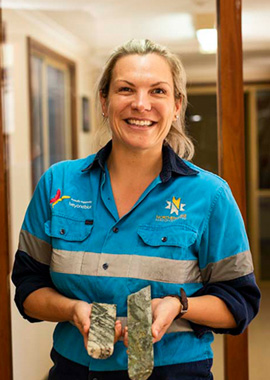Geoscience
Geoscience
Geoscientists locate materials and minerals and advise on their extraction. They also advise on environmental protection and rehabilitation of land after mining.
Key tasks
- Find and help extract of a wide range of minerals, hydrocarbons and various industrial rocks
- Collate historical records, undertake field mapping, secure tenement positions over selected rocks and review historical workings
- Coordinate drilling activities and organise sampling and geophysical surveys to test large tracts of prospective rocks
- Study drill cores and sample data
- Engage in financial markets, valuing assets and undertaking resources-related investment activities
- Work across multidisciplinary teams to undertake surveys to record and preserve natural habitats and sites of anthropological heritage
Skills and attributes
- Collecting and organising information
- Working as part of a multidisciplinary team
- Analytical skills
- Mapping techniques
A typical day
- Geoscientists work in laboratories, offices and in the field. Field work may involve long hours and travelling to remote areas.
Role types
- Exploration Geologist: Determine the geological structure, distribution and age of rocks, and help determine where natural resources may be found.
- Mine Geologist: Control the quality (grade) of the ore mined, and collect and analyse samples.
- Hydrogeologist: Evaluate and manage the quality, quantity, reliability and sustainability of all aspects of water resources.
- Geochemist: Study the distribution of elements in the earth; study the mineral and chemical composition of rocks and examine the transport of pollutants through rock masses.
- Academic/Research Geologist: Investigate why and how things behave the way they do or are the way they are, rather than looking at the economic issues of how to mine.
- Consulting Geologist: Work on many different projects in both underground and open pit mine geology.
- Geostatistician: Apply statistical methods to geological information to determine factors such as quality (grade) and mineral concentration.
- Geophysicist: Study physical aspects of the earth and detect, monitor and forecast seismic, magnetic, electrical, thermal and oceanographic activity.
- Financial Analyst: Financially assess natural resources (and other) investment opportunities that require financing decisions in the corporate, banking and finance sectors.
Nature of work
- Hours will vary depending on where the mine or site is located
- Fly-in/fly-out (FIFO) work may be required
Travel
- Travel is highly likely as many large and small mining companies maintain international operations and exploration activities
- Fieldwork can involve spending time in remote desert, tropical or Antarctic/Arctic regions
